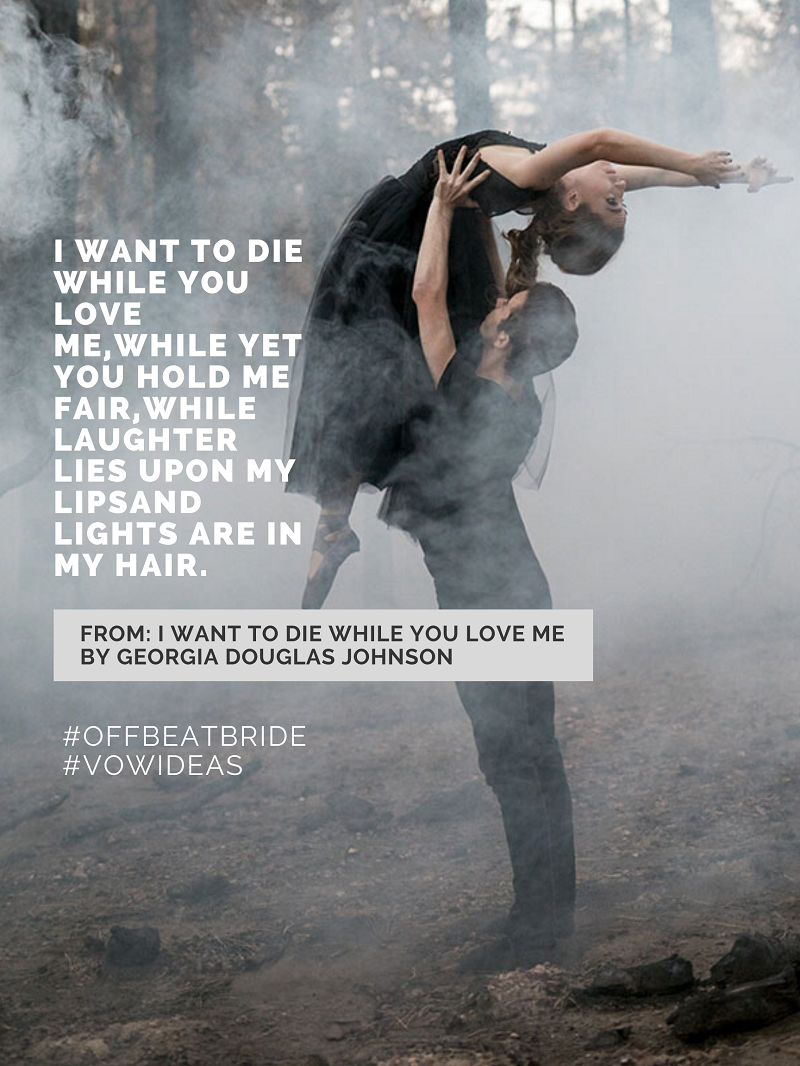
This wedding reading may be a bit macabre for some, but I've always loved poems that possess a certain darkness and beauty at the same time. This poem is one of my favorites and is a great way to get some “'til death do us part” or slightly goth vibes into your wedding ceremony…
I Want to Die While You Love Me
by Georgia Douglas Johnson
I want to die while you love me,
While yet you hold me fair,
While laughter lies upon my lips
And lights are in my hair.
I want to die while you love me,
And bear to that still bed,
Your kisses turbulent, unspent
To warm me when I'm dead.
I want to die while you love me
Oh, who would care to live
Till love has nothing more to ask
And nothing more to give?
I want to die while you love me
And never, never see
The glory of this perfect day
Grow dim or cease to be!
What do you think? Was this reading too grim?
Well, good thing we've got tons of OTHER readings in our giant wedding reading repository!
PS: Share your wedding reading in the comments!







My chorus performed this poem as a song earlier in the year, and it was very controversial among the singers because of its seemingly depressing themes, but for me it helped to learn its historical context. It doesn’t have to be read as macabre.
Georgia Douglas Johnson was a black poet writing during the Harlem Renaissance (circa 1920), and this poem was in part a response to white constructions of black sexuality. The dominant racist discourse saw black people primarily as bodies and therefore black relationships as sexual and procreative but not romantic.
In “I Want to Die While You Love Me,” Johnson is pressing against this racist narrative, describing a relationship that is infused with pure romance, the strongest love she can imagine, in which physical elements are inseparable from emotional.
Composer Rosephanye Powell puts it this way:
“Georgia Douglas Johnson describes a day in which she and her beloved experience the height of passion; one day spent alone in which each finds his/her heart’s pleasure in the other and the fire of love is full flame. It is a day that Johnson hopes will never end and wishes to carry to her death.” In other words, this isn’t a poem about wanting to die, it’s a poem about loving, as intensely as she does on this one passionate day, until the end of life. (Yes, “till death do us part.”) And — historically speaking — about doing so in resistance to a dominant culture that doesn’t believe you even can. People of color are still subjected to these constructions at times, as are people in same-sex relationships. In this context, it can be read not as dark and gothic (though it can be if that’s what you’re into) but as an empowering narrative for anyone who has felt others try to reduce them to mere embodiment.
OMG, thank you so much for sharing this larger historical context!
Thank you for sharing this vital context!